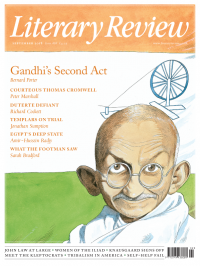Ian Critchley
In a Station of the Métro
Paris Echo
By Sebastian Faulks
Hutchinson 298pp £20
Sebastian Faulks’s fourteenth novel shares many of the preoccupations of the previous thirteen. As in his early trilogy (Birdsong, The Girl at the Lion d’Or and Charlotte Gray) and in much of his most recent novel, Where My Heart Used to Beat, France is the setting, and the story draws heavily on experiences of war. It also continues Faulks’s ongoing interest in the effects of memory and how the past has an impact on both the individual and society.
Unlike many of his novels, however, Paris Echo takes place almost in the present day. It is 2006 and two characters from very different backgrounds are drawn to the French capital. Tariq is nineteen years old and desperate to leave his home in Morocco. Excited by images of Paris he has seen in films, and also drawn there by the fact that his deceased mother was French, he enters France illegally in the back of a lorry. The Paris he finds is somewhat different from that shown in the cinema. He dosses down in decrepit tower blocks and scrapes a living working in a fast-food joint called Paname Fried Poulet.
Then he lucks out. He meets Hannah, an American who has come back to Paris after a ten-year hiatus to research the lives of women during the German Occupation of 1940–44. Hannah takes Tariq in as a lodger and they establish an uneasy but fruitful friendship. Their attitudes towards history

Sign Up to our newsletter
Receive free articles, highlights from the archive, news, details of prizes, and much more.@Lit_Review
Follow Literary Review on Twitter
Twitter Feed
Russia’s recent efforts to destabilise the Baltic states have increased enthusiasm for the EU in these places. With Euroscepticism growing in countries like France and Germany, @owenmatth wonders whether Europe’s salvation will come from its periphery.
Owen Matthews - Sea of Troubles
Owen Matthews: Sea of Troubles - Baltic: The Future of Europe by Oliver Moody
literaryreview.co.uk
Many laptop workers will find Vincenzo Latronico’s PERFECTION sends shivers of uncomfortable recognition down their spine. I wrote about why for @Lit_Review
https://literaryreview.co.uk/hashtag-living
An insightful review by @DanielB89913888 of In Covid’s Wake (Macedo & Lee, @PrincetonUPress).
Paraphrasing: left-leaning authors critique the Covid response using right-wing arguments. A fascinating read.
via @Lit_Review